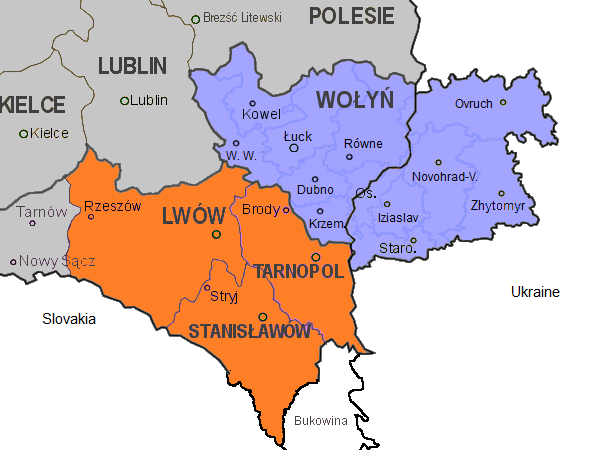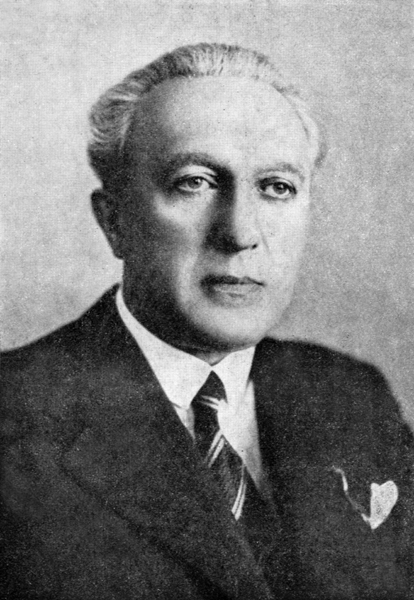|
Jadwiga Sarnecka
Jadwiga Sarnecka (1877 or 1883 – 29 December 1913) was a Polish composer and pianist whose composition ''Ballade'' for piano won second place in a 1910 competition in Lviv (today in Ukraine) commemorating Chopin’s centenary. She also composed works for voice and piano. Biography Sarnecka was born in Slavuta, Volhynia (today in Ukraine). She studied piano with Felicjan Szopski and Władysław Żeleński in Krakow, Poland; Henryk Melcer-Szczawinski and Aleksander Michalowski in Warsaw; and Theodor Leschetizky in Vienna. She presented piano recitals throughout Austria, Germany and Poland. Sarnecka’s compositions were not always favorably reviewed. She self-published her initial works. Arts patron Feliks Jasienski (pseudonym “Manggha”) (1861-1929) funded the publication of subsequent works. Eventually, Sarnecka’s compositions received favorable reviews from Polish music critics Adolf Chybinski, Zdzislaw Jachimecki, and Jozef Wladyslaw Reiss, and A. Piwarski & Compan ... [...More Info...] [...Related Items...] OR: [Wikipedia] [Google] [Baidu] |
Slavuta
Slavuta (, ; ; ) is a city in Shepetivka Raion, Khmelnytskyi Oblast (province) of western Ukraine, located on the Horyn River. The city is located approximately 80 km from the oblast capital, Khmelnytskyi, at around . Slavuta hosts the administration of Slavuta urban hromada, one of the hromadas of Ukraine. Population: 34,301 (2023 estimate); History Located in Volhynia, Slavuta was founded by a member of Zaslawski family in 1633. As the family extinguished, all its possessions were transferred to Lubomirski family. Eventually the town was passed on to Marianna Lubomirska who married Paweł Sanguszko who turned the town into the family seat of the Sanguszko princes. Administratively it was located in the Volhynian Voivodeship in the Lesser Poland Province of the Kingdom of Poland. It was annexed by Russia in the Partitions of Poland. Between 1922 and 1939 it was on the Soviet border with Poland. During World War II, the town was occupied by Germany from 1941 to 1 ... [...More Info...] [...Related Items...] OR: [Wikipedia] [Google] [Baidu] |
Zygmunt Krasiński
Count Napoleon Stanisław Adam Feliks Zygmunt Krasiński (; 19 February 1812 – 23 February 1859) was a Polish poet traditionally ranked after Adam Mickiewicz and Juliusz Słowacki as one of Poland's Three Bards – the Romantic poets who influenced national consciousness in the period of Partitions of Poland. Krasiński was the most famous member of the noble Krasiński family. He was born in Paris to Count Wincenty Krasiński and Princess Maria Urszula Radziwiłł, a member of the aristocratic Radziwiłł family, and became the close companion of his father after his mother's early death from tuberculosis. He was educated by tutors prior to attending the Warsaw Lyceum, where he graduated in 1827. He then started to study law and administration at the Royal University of Warsaw, but was expelled from the university in 1829. In 1829 Krasiński left Poland to study in Geneva. He met Mickiewicz, who dazzled the young writer and played an important part in shaping his l ... [...More Info...] [...Related Items...] OR: [Wikipedia] [Google] [Baidu] |
Polish Classical Pianists
Polish may refer to: * Anything from or related to Poland, a country in Europe * Polish language * Polish people, people from Poland or of Polish descent * Polish chicken * Polish brothers (Mark Polish and Michael Polish, born 1970), American twin screenwriters * Kevin Polish, an American Paralympian archer Polish may refer to: * Polishing, the process of creating a smooth and shiny surface by rubbing or chemical action ** French polishing, polishing wood to a high gloss finish * Nail polish * Shoe polish * Polish (screenwriting), improving a script in smaller ways than in a rewrite See also * * * Polishchuk (surname) * Polonaise (other) A polonaise ()) is a stately dance of Polish origin or a piece of music for this dance. Polonaise may also refer to: * Polonaises (Chopin), compositions by Frédéric Chopin ** Polonaise in A-flat major, Op. 53 (, ''Heroic Polonaise''; ) * Polon ... {{Disambiguation, surname Language and nationality disambiguation pages ... [...More Info...] [...Related Items...] OR: [Wikipedia] [Google] [Baidu] |
1913 Deaths
Events January * January – Joseph Stalin travels to Vienna to research his ''Marxism and the National Question''. This means that, during this month, Stalin, Hitler, Trotsky and Tito are all living in the city. * January 3 – First Balkan War: Greece completes its Battle of Chios (1912), capture of the eastern Aegean island of Chios, as the last Ottoman forces on the island surrender. * January 13 – Edward Carson founds the (first) Ulster Volunteers, Ulster Volunteer Force, by unifying several existing Ulster loyalism, loyalist militias to resist home rule for Ireland. * January 18 – First Balkan War: Battle of Lemnos (1913), Battle of Lemnos – Greek admiral Pavlos Kountouriotis forces the Turkish fleet to retreat to its base within the Dardanelles, from which it will not venture for the rest of the war. * January 23 – 1913 Ottoman coup d'état: Enver Pasha comes to power. February * February 1 – New York City's Grand Central Te ... [...More Info...] [...Related Items...] OR: [Wikipedia] [Google] [Baidu] |
19th-century Births
The 19th century began on 1 January 1801 (represented by the Roman numerals MDCCCI), and ended on 31 December 1900 (MCM). It was the 9th century of the 2nd millennium. It was characterized by vast social upheaval. Slavery was Abolitionism, abolished in much of Europe and the Americas. The First Industrial Revolution, though it began in the late 18th century, expanded beyond its British homeland for the first time during the 19th century, particularly remaking the economies and societies of the Low Countries, France, the Rhineland, Northern Italy, and the Northeastern United States. A few decades later, the Second Industrial Revolution led to ever more massive urbanization and much higher levels of productivity, profit, and prosperity, a pattern that continued into the 20th century. The Catholic Church, in response to the growing influence and power of modernism, secularism and materialism, formed the First Vatican Council in the late 19th century to deal with such problems an ... [...More Info...] [...Related Items...] OR: [Wikipedia] [Google] [Baidu] |
Lucjan Rydel
Lucjan Rydel, also known as Lucjan Antoni Feliks Rydel (17 May 1870 in Kraków – 8 April 1918 in Bronowice Małe), was a Polish playwright and poet from the Young Poland movement. Life Rydel was the son of Lucjan Rydel, a surgeon, ophthalmologist, professor and rector (academia), Rector of Jagiellonian University in Kraków, and of Helena Kremer. In 1904, Rydel wrote a nativity play, ''Polish Bethlehem'' (''Betlejem polskie''), and staged its production in two suburbs of Kraków, Tonie, Kraków, Tonie and Bronowice, Kraków, Bronowice, with local villagers as actors. It was an expression of his profound respect for rural Poland as well as the result of his flair for theatrical experimentation. Rydel left the third and the final act of his play open. In the course of history, new characters, including contemporary Polish politicians and celebrities, were added to it by various producers to make the play appeal to new audiences. An open end play like ''Betlejem polskie'' is a tr ... [...More Info...] [...Related Items...] OR: [Wikipedia] [Google] [Baidu] |
Dux Records
Dux is a Polish classical recording label. It was founded in 1992 by sound engineers Małgorzata Polańska and Lech Tołwiński. The label specialises in Polish artists and Polish composers. Many DUX recordings are premiere recordings, such as Karol Kurpiński's opera ''Zamek na Czorsztynie'' and piano works by Jadwiga Sarnecka. The label is the associate record label of Wratislavia Cantans festival and of the Warsaw Chamber Opera The Warsaw Chamber Opera (, WOK) is a Polish opera company founded in 1961 by Stefan Sutkowski, its managing and artistic director from its inception until his retirement in 2012. On 15 October 1986, the Warsaw Chamber Opera moved into its own t .... References External linksDux.pl {{Authority control Classical music record labels Polish record labels Record labels established in 1992 Polish companies established in 1992 ... [...More Info...] [...Related Items...] OR: [Wikipedia] [Google] [Baidu] |
Volhynia
Volhynia or Volynia ( ; see #Names and etymology, below) is a historic region in Central and Eastern Europe, between southeastern Poland, southwestern Belarus, and northwestern Ukraine. The borders of the region are not clearly defined, but in Ukraine it is roughly equivalent to Volyn Oblast, Volyn and Rivne Oblasts; the territory that still carries the name is Volyn Oblast. Volhynia has changed hands numerous times throughout history and been divided among competing powers. For centuries it was part of the Polish-Lithuanian Commonwealth. After the Russian annexation during the Partitions of Poland, all of Volhynia was made part of the Pale of Settlement on the southwestern border of the Russian Empire. Important cities include Rivne, Lutsk, Zviahel, and Volodymyr (city), Volodymyr. Names and etymology *, ; * ; *, ; * or ; *; * ; *; *; * or (both ); Volhynian German: , , or (all ); *, or . The alternative name for the region is Lodomeria after the city of Volodymyr (city ... [...More Info...] [...Related Items...] OR: [Wikipedia] [Google] [Baidu] |
Zdzisław Jachimecki
Zdzisław Jachimecki (Lwów, 7 July 1882 – 27 October 1953, Kraków) was a Polish historian of music, composer, professor at the Jagiellonian University and the Academy of Music in Kraków, Kraków Music Academy, and member of the Polish Academy of Learning. Life Born in Lwów in 1882, in 1904–5 he studied counterpoint with Arnold Schönberg in Vienna.See Jachimecki's account in the album, ''Dem Lehrer Arnold Schönberg'', at the Arnold Schönberg Center, Vienna. Partial bibliography * ''Mozart. W 150 rocznicę urodzin'' (1906) * ''Hugo Wolf'' (1908) * ''Joseph Haydn, Józef Haydn'' (1910) * ''Richard Wagner, Ryszard Wagner'' (1911) * ''Wspomnienia Karol Kurpiński, Kurpińskiego'' (1911) * ''Artega i Wagner jako teoretycy dramatu muzycznego'' (1912) * ''Muzyka na dworze króla Władysław II Jagiełło, Władysława Jagiełły, 1424–1430'' (1915) * ''Moniuszko'' (1921) * ''Fryderyk Chopin'' (1927) * ''Na marginesie pieśni studenckiej z XV-go wieku'' (1930) * ''Nieuwzgl� ... [...More Info...] [...Related Items...] OR: [Wikipedia] [Google] [Baidu] |
Adolf Chybiński
Adolf Chybiński (29 April 1880 – 31 October 1952) was a Polish historian, musicologist, and academic. Early life and education Adolf Eustachy Chybiński was the son of the industrialist Adolf and Maria z Górskich. He was educated at a gymnasium in Kraków, and studied German, classical philology and law at Jagiellonian University (1898-1899). He received private lessons on piano and music theory in Kraków (1898-1901) from Jan Drozdowski. In 1901-2 he studied in Heidelberg. From 1904-1908 in Munich, he studied musicology, art history and philosophy. In 1908 in Munich he defended his doctorate ''Contributions to the history of the timing and the Kapellmeisteramt in the epoch of Mensuralmusik'' (Beitrage zur Geschichte des Taktschlegens und des Kapellmeisteramtes in der Epoche der Mensuralmusik). He continued his researches into the history of Polish music for several years in Munich, preparing a post-doctoral dissertation under the guidance of Guido Adler. He defended ... [...More Info...] [...Related Items...] OR: [Wikipedia] [Google] [Baidu] |



